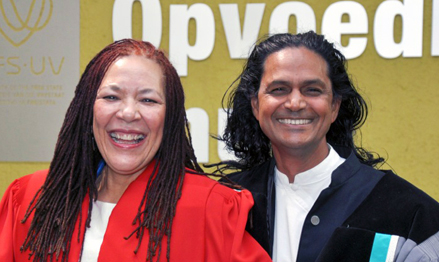Latest News Archive
Please select Category, Year, and then Month to display items
03 January 2020
|
Story Xolisa Mnukwa
|
Photo Supplied
 The UFS Bloemfontein Campus, South Campus, and Qwaqwa Campus choirs are student-centred choirs functioning under the Student Affairs’ Arts, Culture and Dialogue office.
The UFS Bloemfontein Campus, South Campus, and Qwaqwa Campus choirs are student-centred choirs functioning under the Student Affairs’ Arts, Culture and Dialogue office.
It has been a noteworthy year for the University of the Free State (UFS) Choir, establishing itself on the student/university choir scene. The choir, based on the Bloemfontein Campus, represented the UFS at the bi-annual KUESTA choir festival earlier this year, showcasing its musical talent. The choir shared a stage with other university choirs from around the country.
The UFS (Bloemfontein Campus) Choir is a 42-member ensemble of students; the other two choirs, based on the South and Qwaqwa campuses, consist of 40 and 62 members respectively. The choirs are administered and managed by the Division of Student Affairs’ Arts, Culture and Dialogue Office. In addition to Kovsie culture, the choirs strive to have a varied repertoire of inclusive music, with the UFS BFN Campus choir performing a diversity of songs in English, Afrikaans, isiXhosa, and Sesotho.
The new South Campus choir was established in 2018 and is led by choir director, Bonisile Gcisa, who specialises in choral music. This leg of the choir will therefore perform many of his works, but will also include some of the Bloemfontein choir’s set lists, since most of the choir members will be auditioning in 2021 for the Bfn choir when they change campuses.
The Qwaqwa Campus choir will lean more towards a choral genre under the direction of Sipho Khumalo.
The UFS Bloemfontein Campus choir was officially re-established under the leadership of choir conductor Leona Geldenhuys in March 2018, and has performed at several events, including the Rector’s Concert, the annual KUESTA choir convention, and the Bloemfontein Choir invitational. The group has also held a number of public performances on the Thakaneng Bridge at the UFS Bloemfontein Campus.
“Part of the UFS Student Affairs’ objective is to create an inclusive and a socially just student lived experience, and that is the mandate the choirs will also adopt. We hope to create an experience that not only enhances our students’ singing abilities, but also contribute to a more inclusive university experience.” – Angelo Mockie – Director: UFS Student Affairs Arts, Culture and Dialogue office.
“Rest well, be safe, and return rejuvenated,” were his parting words to students for the festive season.
Rhodes professor calls for accountability in teacher education
2013-11-14
|
 |
Prof Jean Baxen of Rhodes University and Prof Dennis Francis, Dean of the Faculty of Education of the UFS.
Photo: Stephen Collett
15 November 2013 |
Lecture (pdf)
“Our education system needs quality teacher education.”
This was the message from Prof Jean Baxen, Deputy Dean of Research at Rhodes University in Grahamstown. She delivered the Education Public Lecture on ‘The lives of children, citizenship and teacher education: challenges and opportunities’ at the University of the Free State’s Bloemfontein Campus.
Growing up in White River, the rural areas of Eastern Transvaal (as it was previously known), Prof Baxen took the audience on a journey of the imagination. She shared stories of how she and fellow learners walked miles to get to school and how her son found himself in a situation of being unsure about his own racial identity, questioning what it meant to be ‘coloured’. She also related stories of how teachers are not sufficiently prepared to mediate information on HIV/Aids.
These stories revealed how little teachers cared, and also how difficult and challenging it is for learners to cope in such teaching and learning environments – thus calling for quality teacher education.
She stressed the fact that quality teacher education is needed in South Africa to assist in curbing the challenges children and fellow citizens come across in our broader society. “It is important that, as teacher educators, we should groom teachers to find and understand their identity, sexuality, and also the world they live in. There is an urgent need for us to hold ourselves and others accountable and to not distance ourselves and make it someone else’s responsibility – it is our joint responsibility as citizens,” she said.
We need a pedagogy that would navigate and start formulating a language that we could use to face these challenges, she proposed.